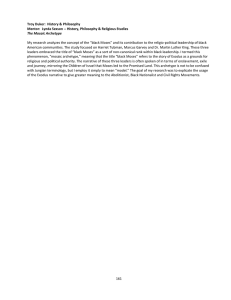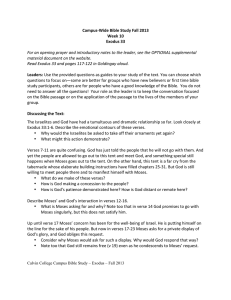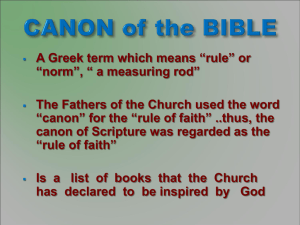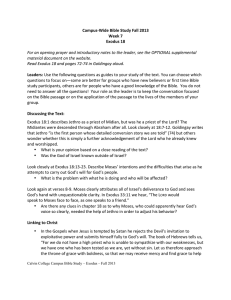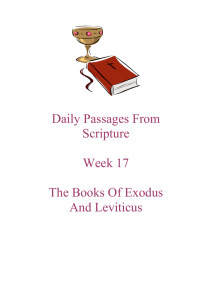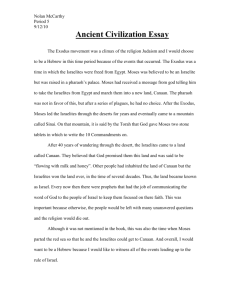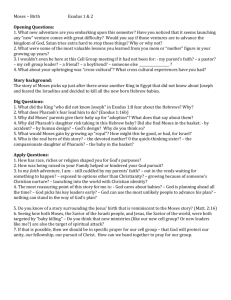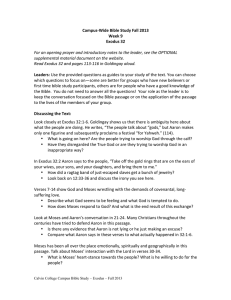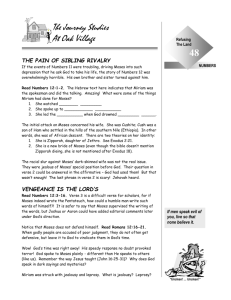Document 14396633
advertisement
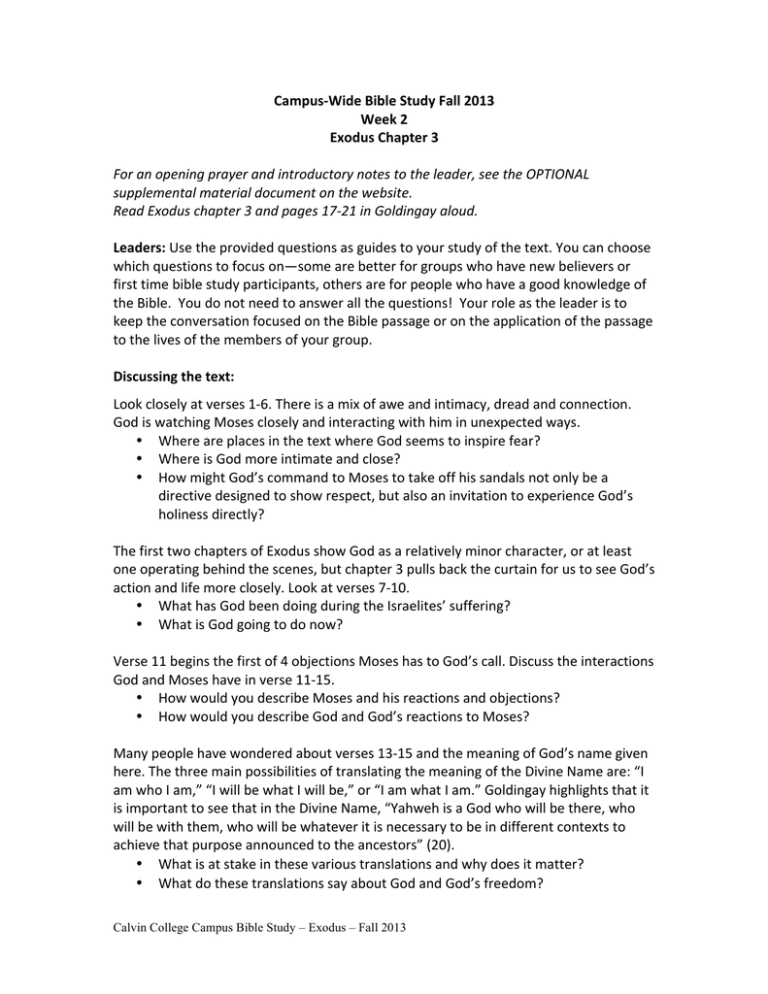
Campus-­‐Wide Bible Study Fall 2013 Week 2 Exodus Chapter 3 For an opening prayer and introductory notes to the leader, see the OPTIONAL supplemental material document on the website. Read Exodus chapter 3 and pages 17-­‐21 in Goldingay aloud. Leaders: Use the provided questions as guides to your study of the text. You can choose which questions to focus on—some are better for groups who have new believers or first time bible study participants, others are for people who have a good knowledge of the Bible. You do not need to answer all the questions! Your role as the leader is to keep the conversation focused on the Bible passage or on the application of the passage to the lives of the members of your group. Discussing the text: Look closely at verses 1-­‐6. There is a mix of awe and intimacy, dread and connection. God is watching Moses closely and interacting with him in unexpected ways. Where are places in the text where God seems to inspire fear? Where is God more intimate and close? How might God’s command to Moses to take off his sandals not only be a directive designed to show respect, but also an invitation to experience God’s holiness directly? The first two chapters of Exodus show God as a relatively minor character, or at least one operating behind the scenes, but chapter 3 pulls back the curtain for us to see God’s action and life more closely. Look at verses 7-­‐10. What has God been doing during the Israelites’ suffering? What is God going to do now? Verse 11 begins the first of 4 objections Moses has to God’s call. Discuss the interactions God and Moses have in verse 11-­‐15. How would you describe Moses and his reactions and objections? How would you describe God and God’s reactions to Moses? Many people have wondered about verses 13-­‐15 and the meaning of God’s name given here. The three main possibilities of translating the meaning of the Divine Name are: “I am who I am,” “I will be what I will be,” or “I am what I am.” Goldingay highlights that it is important to see that in the Divine Name, “Yahweh is a God who will be there, who will be with them, who will be whatever it is necessary to be in different contexts to achieve that purpose announced to the ancestors” (20). • What is at stake in these various translations and why does it matter? • What do these translations say about God and God’s freedom? Calvin College Campus Bible Study – Exodus – Fall 2013 In the midst of Moses’ objections in verse 16 God is already calling Moses to action. Trace the patterns of human and divine action in verses 16-­‐22. Where is God active? Where are Moses or other people active? How do the divine and human wills interact here? Linking to Christ: • This passage is not the only place in Scripture where God tells someone to take off their shoes. In John chapter 13 Jesus asks his disciples to take off their shoes so that Jesus can touch and wash their feet, showing them an example of love and humility that they will be blessed if they live into and pass on. How can Jesus’ washing of the disciple’s feet inform our reading of Exodus 3? How does Jesus’ example expand the portrayal of God in Exodus 3? Discussing the World: How does this chapter expand or challenge your understanding of God, or what you have been taught about God? How is God fearful to you or warm? Does God’s watching of you make you nervous or empowered? Describe how God might be calling you to deeper life and intimacy or do you feel that you are calling out to God and waiting for God’s response? Verse 7 says that God “knows” the suffering of the Israelites. This verb in Hebrew is connected to the word for “hand” and it implies not just knowledge, but intimacy. It implies touch and some would say vulnerability. How do we know that God is a vulnerable God, one who knows your pain and the pain of the oppressed, a God that hears your cries for help (verse 9) even if your cry is not a formal prayer? How do we develop an understanding of God as gracious and dangerous as the portrayal we see here? Goldingay writes, “God’s leaders often need to be drafted. In politics, you have to run for election by the people. Moses runs from election by God” (21). He also points out that vocation is not about personal fulfillment or an invitation, but about fulfilling God’s purposes which is not something “the servant has an option about” (19). How does this challenge our current understandings of calling and vocation? Verses 21-­‐22 have God telling Moses that God will work so powerfully that the Israelites will be able, one day, to ask their oppressors for jewelry and clothing and they will give it to the Israelites. What would it look like for a society to bless those who are oppressed by not only allowing them their God-­‐given freedom but adorning them with gifts from our own homes? What would have to happen to create such an atmosphere of jubilee and liberation? How can you develop such a culture in the places where you have influence? Calvin College Campus Bible Study – Exodus – Fall 2013
